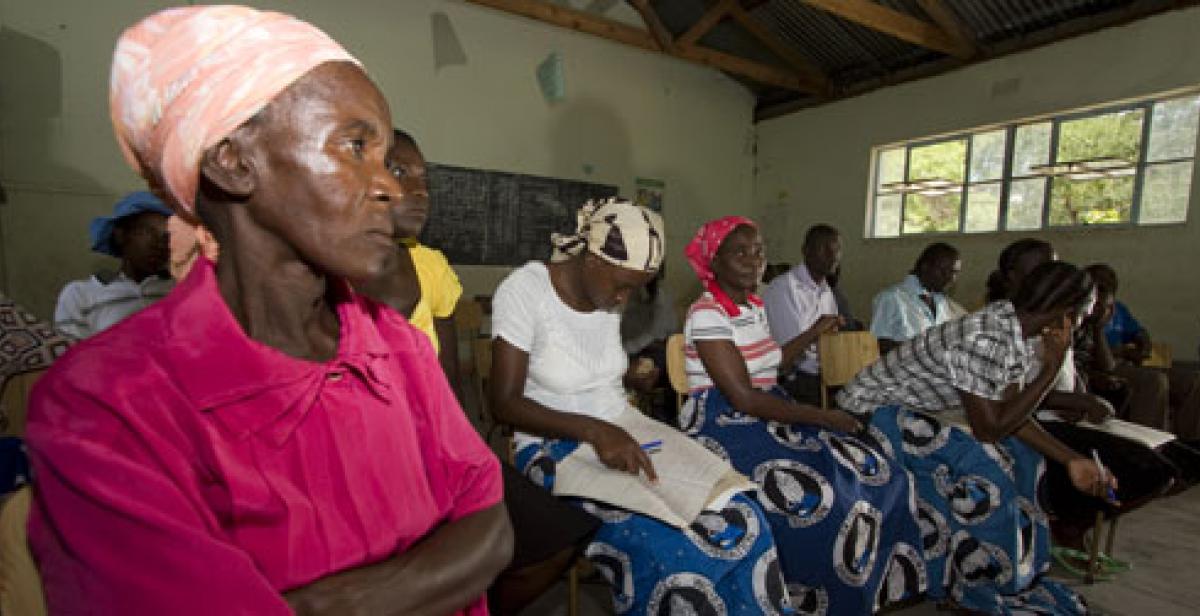What do we mean when we talk about getting people’s voices heard in the places where decisions are made?
We had a chance to do just this in November when the UK hosted a high-powered UN panel who’ve been asked to kick off the planning process for developing new poverty reduction goals. Progressio was lucky enough to get a last-minute invitation to the sessions that panelists as diverse as the activist Tawakul Karman from Yemen, South Africa’s Graca Machel, and Unilever’s Chief Executive Paul Polman held with civil society organisations.
Last minute stuff
It was pretty last minute stuff, but before heading into the meeting, we asked our country offices to share their views, and those of Progressio’s partners: What goals should the world set itself if we are to end poverty for good? What did they want us to say to the panel?
Well, our colleagues had lots to say, and we tried hard to get messages across. I found myself on a table with panellists including a finance minister from a low income country, the CEO of a multinational company, the personal envoy of an African President, and a North American politician – and in the civil society corner, colleagues from Egypt, the Philippines, the UK and Colombia. We also sent in recommendations in writing.
Were the panellists listening?
Well, the full report of the consultation sessions with the High Level Panel has now been released – and I’m pleased to see our comments cited on several points where Progressio campaigners and colleagues on the ground want to see action.
A first point we made was about the process itself. The UN’s report notes (on page 13) that "Progressio indicated that the UN and the HLP must ensure 'meaningful processes for inclusive civil society engagement'…" (as one of many similar voices raised).
We’ve been worried that the panel wasn’t trying hard enough to consult with ordinary people. It is great that NGOs like us have been able to speak to the panel, but this is not the same as hearing from poor and marginalised people themselves.
We came away from the day reassured (slightly) on this point: the panel seemed clear that there was more to do, and there was information about two big initiatives, the Participate initiative (convened by the Institute of Development Studies and Beyond 2015) and MY World which will be researching the views of the public in the run up to 2015 goal-setting.
Natural resources are for everyone
The next point we pressed on was the importance of natural resources management: right across our country programmes, partners and staff were very clear that if we don’t look after our natural resources – like water and land – in a fair and sustainable way, then we won’t be able to tackle poverty. For instance, if the water smallholder farmers depend on is diverted, or overused, their livelihoods will be threatened. The report quotes us making the following points:
- “to ensure sufficient water for the lives and livelihoods of all, equitable, sustainable, inclusive and participatory management of water with a pro-poor focus is essential”
- “Progressio urged increased attention to water security in light of increasing water scarcity, which is a problem in itself but also affects food security and the livelihoods of smallholder farmers”
Are we reassured here? Well, the panel made some of the right noises. But there is a big debate to win here. Some aren’t convinced that it makes sense to mix poverty and environment goals together, as it could make the final framework more complicated and harder to implement. Progressio will keep arguing that we must try to hold them together – because, for the people we work with, their livelihoods are so closely tied to their ability to have fair and sustainable access to water.
Conflict-affected countries need more help to tackle poverty
Many of Progressio’s partners work in countries which are affected by, recovering from, or at risk of conflict – like Yemen, Haiti, and Somaliland. We heard a strong message from our colleagues on the ground that such countries are a special case, and need particular attention. Countries affected by conflict struggle to tackle poverty, because instability undermines attempts to build up economies and provide services.
The UN’s write-up noted “the adverse impacts of insecurity in fragile and conflict-ridden States, with many CSOs, including Progressio…emphasizing that particular attention must be paid to the poor in these States who are often left behind.”
This is just the start…
Of course, we couldn’t raise everything we’d have liked to, though together with the other organisations present, we did cover a lot. It is just the start of the debate, and the most important thing will be to hear from poor and marginalised people themselves. If you’d like to make your own views known, you can: MY World is an online survey designed to gather the views of people all over the world, whether in richer or poorer countries. Anyone can take part, and the survey doesn’t take long to complete. For people without the internet, or a smartphone, the organisers will be taking the same questions out in pen and paper form over the coming months.
Tim Aldred is Progressio's Head of Policy and Communications
Photo: Women and men from Kariyangwe in Zimbabwe at a meeting to discuss a governance project being run by Progressio partner organisation CCJP (Catholic Commission for Justice and Peace) with support from our development worker Arkmore Kori (photo © Macpherson Photography/Progressio)



